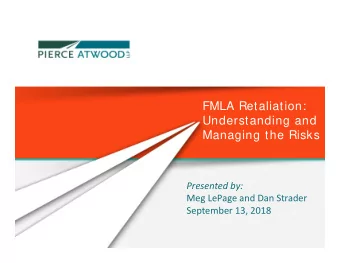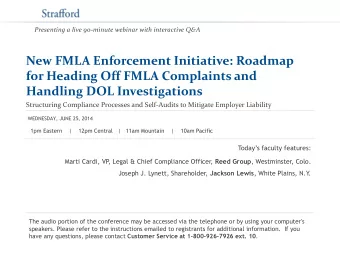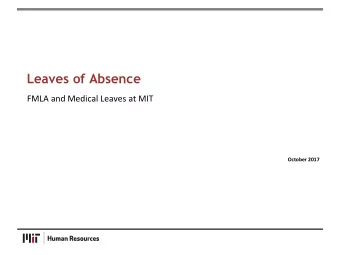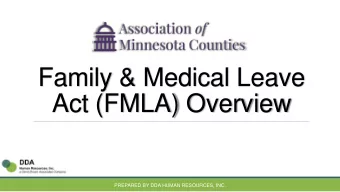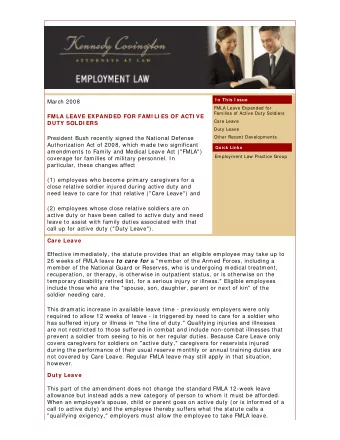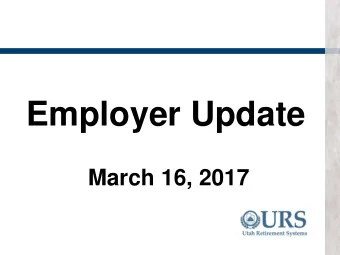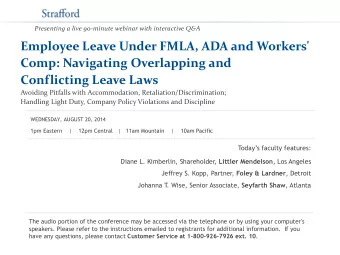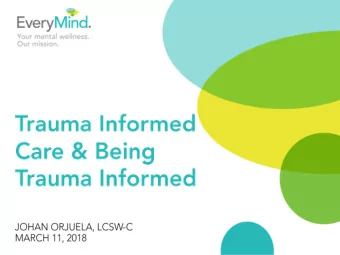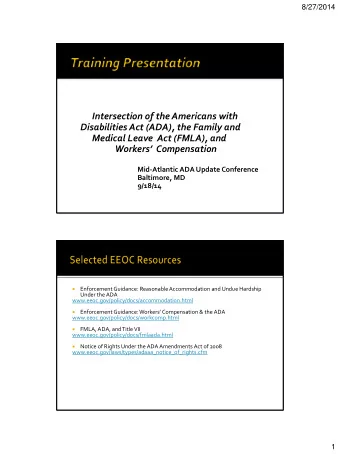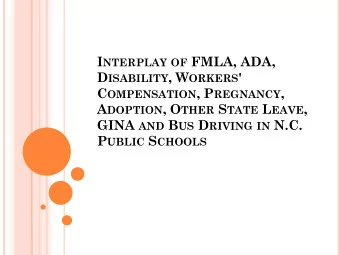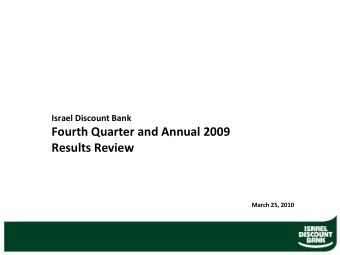
Navigating the FMLA and the ADA: What Every Employer Needs to Know - PowerPoint PPT Presentation
Navigating the FMLA and the ADA: What Every Employer Needs to Know April 15, 2014 Presented by: D. Lewis Clark Jr. lew.clark@squiresanders.com Tara A. Aschenbrand tara.aschenbrand@squiresanders.com 39 Offices in 19 Countries Agenda
Navigating the FMLA and the ADA: What Every Employer Needs to Know April 15, 2014 Presented by: D. Lewis Clark Jr. lew.clark@squiresanders.com Tara A. Aschenbrand tara.aschenbrand@squiresanders.com 39 Offices in 19 Countries
Agenda • Americans with Disabilities Amendments Act Update • Family and Medical Leave Act Overview and Update www.squiresanders.com www.employmentlawworldview.com
Americans with Disabilities Act • The ADA protects qualified individuals with disabilities from discrimination in employment. • The ADA applies to employers who have at least fifteen employees. • An individual has a disability under the ADA if the person has a physical or mental impairment that substantially limits one or more major life activity, has a record of such an impairment, or is regarded as having such an impairment. • To be a “qualified” individual under this framework, the person must be able to perform the essential functions of the job, with or without reasonable accommodation. www.squiresanders.com www.employmentlawworldview.com
What is a disability? • The ADA defines “ disability ” as: A physical or mental impairment that substantially limits one or more major life activities; Having a “ record ” of such an impairment; or Being “ regarded as ” having such an impairment. www.squiresanders.com www.employmentlawworldview.com
Anxiety from Fear of Losing Job Huiner v. Arlington School District, 2013 U.S. Dist. LEXIS 138318 (D.S.D. 2013) • Employee put on performance plan then developed severe anxiety at prospect of losing job Lost 30 pounds over nine months, difficulty caring for children, sleep issues, etc. Requested accommodations, some of which were granted • Court said employee met standards for showing that anxiety constituted a disability under ADA Partially based on new relaxed standards under ADAAA www.squiresanders.com www.employmentlawworldview.com
Disclosure of Medications & Safety Stahly v. S. Bend Pub. Transp. Corp., 2013 U.S. Dist. LEXIS 721 (N.D. Ind. 2013) • Employee took medication and suffered anxiety attack, which led to FMLA leave Employer was aware of events • Employer also required that all employees disclose all medications they were taking Justified for safety reasons • Regarded employee as disabled, even if she really was not disabled • Request for medications is not job related and violates the proscription of certain inquiries of employees about disabilities. www.squiresanders.com www.employmentlawworldview.com
Interactive Process: Employer Inquiry Kelley v. Amazon.com, Inc., 2013 U.S. Dist. LEXIS 166534 (E.D. Wash. 2013) • Is employer required to ask if disability is causing poor job performance if they don’t suspect it? • Employee suffered from migraines and other issues, took FMLA leave and had modifications to work schedule • Put on performance plan and disciplined several times • Employee never notified employer of possible connection between disability and job performance issues • Employer not obligated to affirmatively explore connection • Employer also not required to accommodate by allowing lowered expectations when a uniform performance standard is required www.squiresanders.com www.employmentlawworldview.com
Interactive Process: Employer Inquiry Dinse v. Carlisle Foodservice Prods., 2013 U.S. App. LEXIS 22513 (10 th Cir. 2013) • Employee had multiple health issues, of which employer was aware because of use of sick leave • Employee’s job performance continued to suffer, had several meetings with employer • Employee informed employer of upcoming surgery and requested a laptop so he could work from home and return more quickly • Employee was terminated several days later www.squiresanders.com www.employmentlawworldview.com
Interactive Process: Employer Inquiry • Did employer have obligation to enter into interactive process? • While employer was aware of disability, they were not aware that disability was leading to poor job performance Employer requires more than just awareness to trigger obligation • Even with accommodation, wouldn’t be able to meet essential functions of position • Also, laptop was not an accommodation, it would only help him return to work quicker, it would not help him meet essential functions • Employer’s obligation to engage in interactive process was not triggered www.squiresanders.com www.employmentlawworldview.com
Reasonable Accommodation Feist v. Louisiana, 730 F.3d 450 (5 th Cir. 2013) • Employee had knee problem and requested accommodation of free on-site parking space • Employer refused, said it would not help her perform essential function of job • Court looked outside of ADA and to the EEOC for guidance on definition of “reasonable accommodation” • “Reasonable accommodation” can also include actions that enable a worker to “enjoy the benefits and privileges of employment Which could include an on-site parking spot • Does not have to be a link between essential function of position and request for reasonable accommodation www.squiresanders.com www.employmentlawworldview.com
Reasonable Accommodation Santandreu v. Miami Dade County, 2013 U.S. App. LEXIS 5542 (11 th Cir. 2013) • Employee took leave for several health issues. Leave was extended several times. After fifteen months of leave, employer terminated employee when additional leave was requested • ADA does not require an employer to provide leave for an indefinite period of time • Employee was still unable to show when he would be able to return to work and perform essential functions of position • No bright line rule – depends on situation, employer’s leave rules and employer’s needs www.squiresanders.com www.employmentlawworldview.com
Essential Functions Scott-Bolton v. State of Alabama Bd. of Pardons & Paroles, 2013 U.S. Dist. LEXIS 40942 (N.D. Ala. 2013) • Probation officer suffered from multiple sclerosis and unable to pass weapons requalification test Weapons skills rarely used, but qualification was statutory component of job description • Requested permanent transfer to desk job • Held that essential function of job does not have to be done frequently in order to be considered essential Employer also not required to create desk-only job where one did not previously exist www.squiresanders.com www.employmentlawworldview.com
Disability: Overweight Powell v. Gentiva Health Servs., 2014 U.S. Dist. LEXIS 17709 (S.D. Ala. 2014) • Salesperson selling hospice services. Performance review noted: “would not even discuss her weight”. • “However, plenty of people with an 'undesirable' physical characteristic are not impaired in any sense of the word. To illustrate the point, suppose plaintiff wore her hair in a neon green mohawk. Such an unconventional hairstyle choice might be viewed as unprofessional, and might well impede her efforts to sell hospice services to physicians and senior living facilities, but it obviously is not a physical impairment. The same goes for weight. An overweight sales representative may have difficulty making sales if the prospective customer perceives her appearance to be unprofessional, but that does not render her weight a 'physical or mental impairment' within any rational definition of the phrase.” www.squiresanders.com www.employmentlawworldview.com
Disability: Overweight • Court notes that there are situations in which weight could be physical impairment i.e. job requirement of climbing a ladder or climbing flights of stairs But that is not the case here • The fact that the employee may have believed that “customers did not want to buy hospice services from an overweight salesperson is no more a perception of an impairment than a belief that customers do not want to buy hospice services from a salesperson with a brightly colored, rebellious hairstyle.” • Held in favor of employer as there was no evidence that employer perceived employee to have an impairment www.squiresanders.com www.employmentlawworldview.com
Credit Information • For those you who require CLE or HRCI credits please note the following states have been approved, California, Ohio and Texas; as well as Arizona, New York, and New Jersey through state reciprocity laws. CPD and COE have also been approved. If you require credit in a jurisdiction not pre-approved we can assist. • Tomorrow you will receive an email with a link to an online affidavit. Open this link and complete the form. Don’t forget to include the affirmation code on the form. Once completed, PDF a copy of the signed form to Robin Hallagan at robin.hallagan@squiresanders.com • Remember to complete the webinar survey immediately following the end of this presentation. You are required to complete this evaluation before receiving a certificate of attendance. www.squiresanders.com www.employmentlawworldview.com
Family & Medical Leave Act • Eligible Employees Employees are eligible for leave if they: Worked for their employer at least 12 months; Worked at least 1,250 hours over the past 12 months; Work at a location where the company employs 50 or more employees within 75 miles. www.squiresanders.com www.employmentlawworldview.com
Recommend
More recommend
Explore More Topics
Stay informed with curated content and fresh updates.




